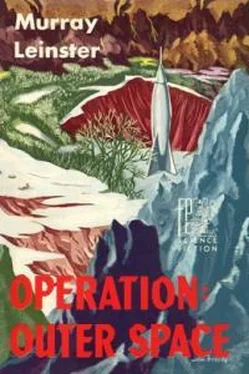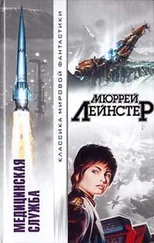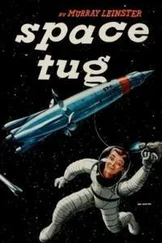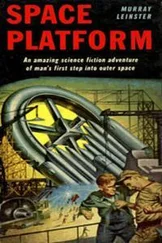"I see," said Jamison above the rocket–thunder, "forests of giant trees like the sequoias of Mother Earth. I see rushing rivers, foaming along their rocky beds, taking their rise in glaciers. We are still too high to look for living creatures, but we descend swiftly. Now we are level with the highest of the mountains. Now we descend below their smoking tops. Under us there is a vast valley, miles wide, leagues long. Here a city could be built. Over it looms a gigantic mountain–spur, capped with green. One would expect a castle to be built there."
He raised his eyebrows at Cochrane. They were well in atmosphere, now, and it had been an obvious defect—condition—necessity of the Dabney field that both of its plates should be in a vacuum. One was certainly in air now. But Cochrane made that gesture which in television production–practice informs the actors that time to cutting is measured in tens of seconds, and he held up two fingers. Twenty seconds.
"We gaze, and you gaze with us," said Jamison, "upon a world that future generations will come to know as home—the site of the first human colony among the stars!"
Cochrane began to beat time. Ten, nine, eight—.
"We are about to land," Jamison declaimed. "We do not know what we shall find—What's that?" He paused dramatically. "A living creature?—A living creature sighted down below! We sign off now—from the stars!"
The ending had been perfectly timed. Allowing for a three–second interval for the broadcast to reach the moon, and just about two more for it to be relayed to Earth, his final word, "Stars!" had been uttered at the precise instant to allow a four–minute commercial by Intercity Credit, in the United States, by Citroen in Europe, by Fabricanos Unidos in South and Central America, and Near East Oil along the Mediterranean. At the end of that four minutes it would be time for station identification and a time–signal, and the divers eight–second flashes before other programs came on the air.
The rockets roared and thundered. The ship went down and down. Jamison said:
"I thought we'd be cut off when we hit air!"
"That's what Jones thought," Cochrane assured him. He bellowed above the outside tumult, "Bell! See anything alive down below?"
Bell shook his head. He stayed at the camera aimed out a blister–port, storing up film–tape for later use. There was the feel of gravitation, now. Actually, it was the fact that the ship slowed swiftly in its descent.
Cochrane went to a port. The ship continued its descent.
"Living creature? Where?"
Jamison shrugged. He had used it as a sign–off line. An extrapolation from the fact that there was vegetation below. He looked somehow distastefully out the port at a swiftly rising green ground below. He was a city man. He had literally never before seen what looked like habitable territory of such vast extent, with no houses on it. In a valley easily ten miles long and two wide, there was not a square inch of concrete or of glass. There was not a man made object in view. The sky was blue and there were clouds, but to Jamison the sight of vegetation implied rooftops. There ought to be parapets where roofs ended to let light down to windows and streets below. He had never before seen grass save on elevated recreation–areas, nor bushes not arranged as landscaping, and certainly not trees other than the domesticated growths which can grow on the tops of buildings. To Jamison this was desolation. On the moon, absence of structures was understandable. There was no air. But here there should be a city!
The ship swayed a little as the rockets swung their blasts to balance the descending mass. The intended Mars–ship slowed, and slowed, and hovered—and there was terrifying smoke and flame suddenly all about—and then there was a distinct crunching impact. The rockets continued to burn, their ferocity diminished. They slackened again. And yet again. They were reduced to a mere faint murmur.
There was a remarkable immobility of everything. It was the result of gravity. Earth–value gravity, or very near it. There was a distinct pressure of one's feet against the floor, and a feeling of heaviness to one's body which was very different from Lunar City, and more different still from free flight in emptiness.
Nothing but swirling masses of smoke could be seen out the ports. They had landed in a forest, of sorts, and the rocket–blasts had burned away everything underneath, down to solid soil. In a circle forty yards about the ship the ground was a mass of smoking, steaming ash. Beyond that flames licked hungrily, creating more dense vapor. Beyond that still there was only coiling smoke.
Cochrane's headphones yielded Babs' voice, almost wailing:
" Mr. Cochrane! We must have landed! I want to see! "
Cochrane pressed the hand–mike button.
"Are we still hooked up to Lunar City?" he demanded. "We can't be, but are we?"
" We are ," said Babs' voice mutinously. " The broadcast went through all right. They want to talk to you. Everybody wants to talk to you! "
"Tell them to call back later," commanded Cochrane. "Then leave the beam working—however it works!—and come up if you like. Tell the moon operator you'll be away for ten minutes."
He continued to stare out the window. Al, the pilot, stayed in his cushioned seat before the bank of rocket–controls. The rockets were barely alight. The ship stayed as it had landed, upright on its triple fins. He said to Jones:
"It feels like we're solid. We won't topple!"
Jones nodded. The rocket–sound cut off. Nothing happened.
"I think we could have saved fuel on that landing," said Jones. Then he added, pleased, "Nice! The Dabney field's still on! It has to be started in a vacuum, but it looks like it can hold air away from itself once it's established. Nice!"
Babs rushed up the stairs. She gazed impassionedly out of a vision–port. Then she said disappointedly:
"It looks like—"
"It looks like hell," said Cochrane. "Just smoke and steam and stuff. We can hope, though, that we haven't started a forest fire, but have just burned off a landing–place."
They stared out. Presently they went to another port and gazed out of that. The smoke was annoying, and yet it could have been foreseen. A moon–rocket, landing at its space–port on Earth, heated the tarmac to red–hotness in the process of landing. Tender–vehicles had to wait for it to cool before they could approach. Here the ship had landed in woodland. Naturally its flames had seared the spot where it came down. And there was inflammable stuff about, which caught fire. So the ship was in the situation of a phoenix, necessarily nesting in a conflagration. Anywhere it landed the same thing would apply, unless it tried landing on a glacier. But then it would settle down into a lake of boiling water, amid steam, and could expect to be frozen in as soon as its landing–place cooled.
Now there was nothing to do. They had to wait. Once the whole ship quivered very slightly, as if the ground trembled faintly under it. But there was nothing at which to be alarmed.
They could see that this particular forest was composed mainly of two kinds of trees which burned differently. One had a central trunk, and it burned with resinous flames and much black and gray–black smoke. The other was a curious growth—a solid, massive trunk which did not touch ground at all, but was held up by aerial roots which supported it aloft through very many slender shafts widely spread. Possibly the heavier part was formed on the ground and lifted as its air–roots grew.
It was irritating, though, to be unable to see from the ship so long as the fire burned outside. The pall of smoke lasted for a long time. In three hours there were no longer any fiercely blazing areas, but the ashes still smouldered and smoke still rose. In three hours and a half, the local sun began to set. There were colorings in the sky, beyond all comparison glorious. Which was logical enough. When Krakatoa, back on Earth, blew itself to bits in the eighteen hundreds, it sent such volumes of dust into the air that sunsets all around the globe were notably improved for three years afterward. On this planet, smoking cones were everywhere visible. Volcanic dust, then, made nightfall magnificent past description. There was not only gold and crimson in the west. The zenith itself glowed carmine and yellow, and those in the space–ship gazed up at a sky such as none of them could have imagined possible.
Читать дальше






